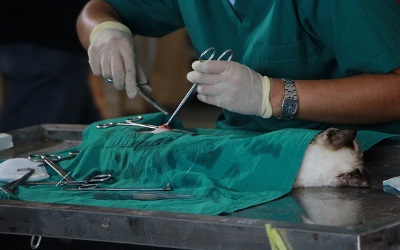At Westlands Veterinary Clinic, we can perform a variety of surgeries. With decades of experience, we will provide your beloved pet with the very best care possible.
Veterinary Surgical Procedures
Some of the surgeries we can do include but are not limited to:
- Removal of lumps: Papilloma and other growths that prevent potential cancer and more.
- Declawing: Removing your cat’s claws and the small bones which will prevent scratching.
- Spay and Neuter: This will increase your pet’s life span. To learn more about spay and neuter, click here.
- C-Section: For pregnant mothers experiencing delivery problems.
- Abdominal Exploratory Surgery: When X-rays alone do not help, it may be necessary to check internally.
- Amputation: Removal of a damaged or diseased limb.
- Foreign Body Removal: When your pet eats something that causes a dangerous obstruction, it may be necessary to remove it surgically.
- Twisted stomach or bloat emergency surgery: Also known as gastric dilatation-volvulus (GDV) syndrome, which causes life-threatening stomach rotation in dogs.
- Splenectomy: Removal of a ruptured spleen or abnormal growth.
- Fracture Repair: Fractures are treated with plates or screws to stabilize the broken bone.
- Eye removal: There are times it may be necessary to remove the pet’s eye to eliminate pain if it has been severely infected or traumatized.
- Dental Extraction: To read more about dental care, please click here.
- Hernia Repair
- Wound Repair
- Thyroidectomy: The removal of the thyroid gland.
- Some orthopedic surgeries
- Emergency surgeries
- Vascular Surgery
Pre-Surgery Exam
- Before the surgery, we will thoroughly explain the procedure and answer any questions you may have.
- You will also be fully informed before any kind of treatment is administered.
- We perform pre-operative bloodwork to determine what anesthesia agents best meet your pet’s individual needs.
- We monitor your pet’s vitals during the surgery, including heart rate, EKG, respiratory rate, blood pressure, temperature, oxygen, and carbon dioxide levels throughout the surgery.
Pain Management
- We assess your pet’s pain level and treat it accordingly before, during, and after surgery. Pain has many detrimental effects on the body mainly it can slow down healing and even worsens diseases like arthritis and cancers.
- We find the exact pain protocol tailored to your pet’s individual needs and use a combination of NSAIDs, local anesthetics, and narcotic pain relievers.
- We monitor your pet very carefully after surgery. The amount of time your pet will stay with us depends on the nature of the operation. Some pets will be monitored overnight, while others may need to stay with us longer for careful observation.
At-Home Recovery
- We will thoroughly discuss your pet’s post-operative care with you so that your pet heals quickly.
- We may prescribe oral medications and antibiotics if necessary.
- An e-collar may be given and is required to prevent your pet from licking, biting, or scratching the surgery site.
- Restrictions on activity, dietary considerations, and other ways to keep your pet comfortable will be discussed.
- Your pet will be scheduled for follow-up visits to ensure that they are recovering and healing appropriately.
Call (+254)79777779 to schedule an appointment
-
Contact Us
-
09 Mayfair Maisonettes, A2,
Westlands, Nairobi, Kenya
(+254) 797 777179
[email protected]
-
-
About
-
Westlands Vet Clinic is focused on furnishing you and your pets with the very best in veterinary treatment. We will work with you every step of the way to create symptomatic, treatment, and preventive designs that best meet the individualized needs of your pet.
-
Made with ![]() by The Best Marketing Shop
by The Best Marketing Shop

